Key takeaways
- Utilitarianism focuses on maximizing overall happiness but faces challenges in measuring happiness and addressing individual rights.
- John Stuart Mill distinguishes between higher and lower pleasures, emphasizing the quality of happiness in moral considerations.
- Critiquing philosophical theories, like Mill’s utilitarianism, involves examining real-life scenarios and contrasting them with alternative ethical frameworks.
- Effective critique in philosophy promotes patience, exploration of uncertainty, and ongoing dialogue rather than merely identifying flaws.
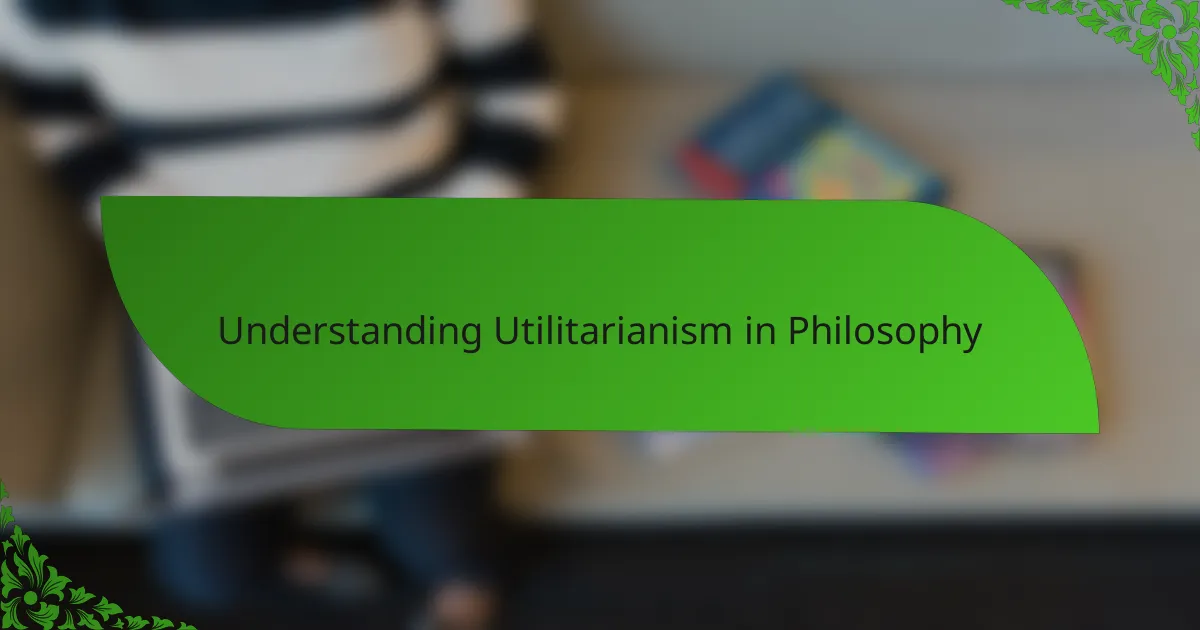
Understanding Utilitarianism in Philosophy
When I first encountered utilitarianism, I was struck by its simple appeal: the idea that the best action is the one that maximizes overall happiness. It seemed straightforward, almost too good to be true. But does measuring happiness really capture the full complexity of human experience?
Utilitarianism, especially as articulated by John Stuart Mill, emphasizes consequences and the greatest good for the greatest number. Yet, I often wonder—can we reduce ethical decisions to just calculations of pleasure and pain? How do we account for individual rights or justice within this framework?
Reflecting on my own experiences, I’ve found that utilitarianism pushes me to think beyond myself. It challenges me to consider how my choices impact others, which is a powerful reminder that ethics is not just personal but profoundly social. But this also raises difficult questions about whose happiness counts most and how to balance competing interests fairly.
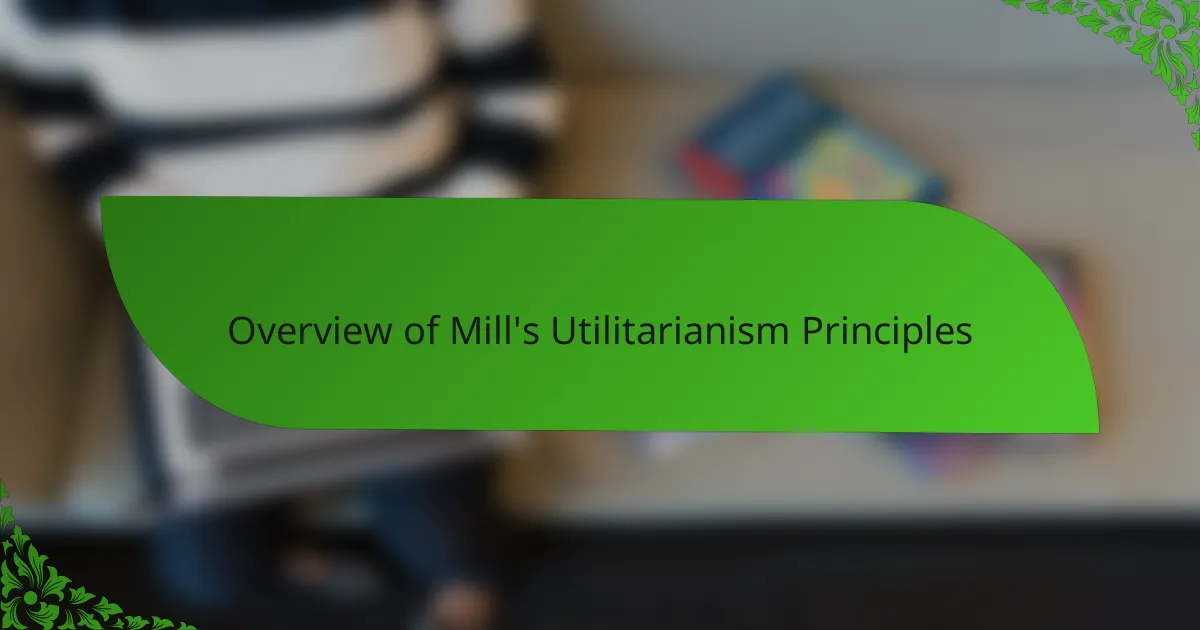
Overview of Mill’s Utilitarianism Principles
Mill’s version of utilitarianism builds on the simple idea of maximizing happiness but adds a crucial refinement: not all pleasures are equal. I remember wrestling with this distinction between higher and lower pleasures—intellectual joys versus more basic physical ones—and it made me realize how nuanced his approach really is. It’s as if Mill is asking us to think carefully about quality, not just quantity, when evaluating happiness.
What struck me most was Mill’s emphasis on individual liberty within the utilitarian framework. He argued that people should be free to pursue their own happiness as long as they don’t harm others. This balance between freedom and collective well-being felt both practical and inspiring, yet I found myself questioning how well it works when interests collide in real life.
Another aspect that caught my attention was Mill’s belief in the “greatest happiness principle” as the foundation for morality. It sounds clear-cut, but when you consider the complexity of human emotions and social dynamics, it becomes less straightforward. I often ask myself: can one single metric truly capture what’s right or wrong across such a diverse set of lives and experiences? This tension is exactly what made critiquing Mill so fascinating.
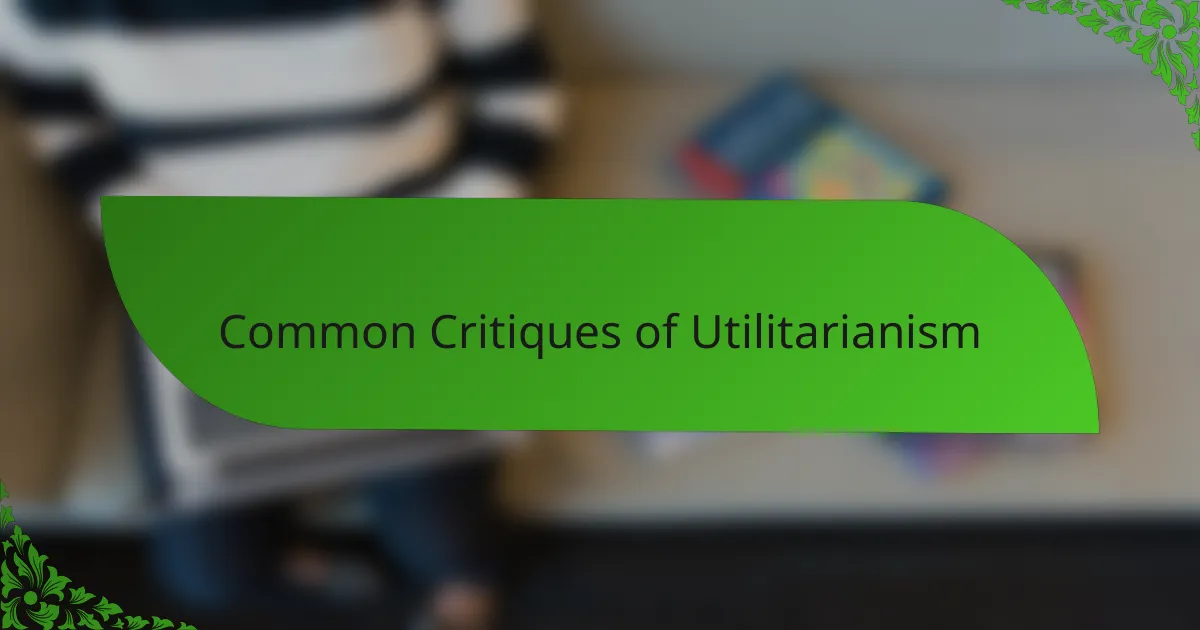
Common Critiques of Utilitarianism
One common critique I keep coming back to is how utilitarianism seems to demand that we always sacrifice individual rights for the greater good. I’ve seen this tension play out in difficult moral dilemmas where protecting one person’s dignity clashes with maximizing overall happiness. Doesn’t it feel unsettling that a framework focused on happiness might overlook the importance of justice and fairness?
Another critique that struck me personally is the challenge of measuring happiness itself. How do we weigh different kinds of pleasures against each other, or compare one person’s joy to another’s suffering? I’ve often wondered whether reducing ethics to calculations risks turning people into mere numbers, ignoring the depth of human experience.
Then there’s the issue of predictability: utilitarianism asks us to foresee the consequences of our actions, but life is rarely that clear-cut. I recall facing situations where outcomes were uncertain, and relying on a happiness calculus felt more like guesswork than ethical clarity. This unpredictability made me question how practical utilitarianism is when we can’t truly know the real impact in advance.
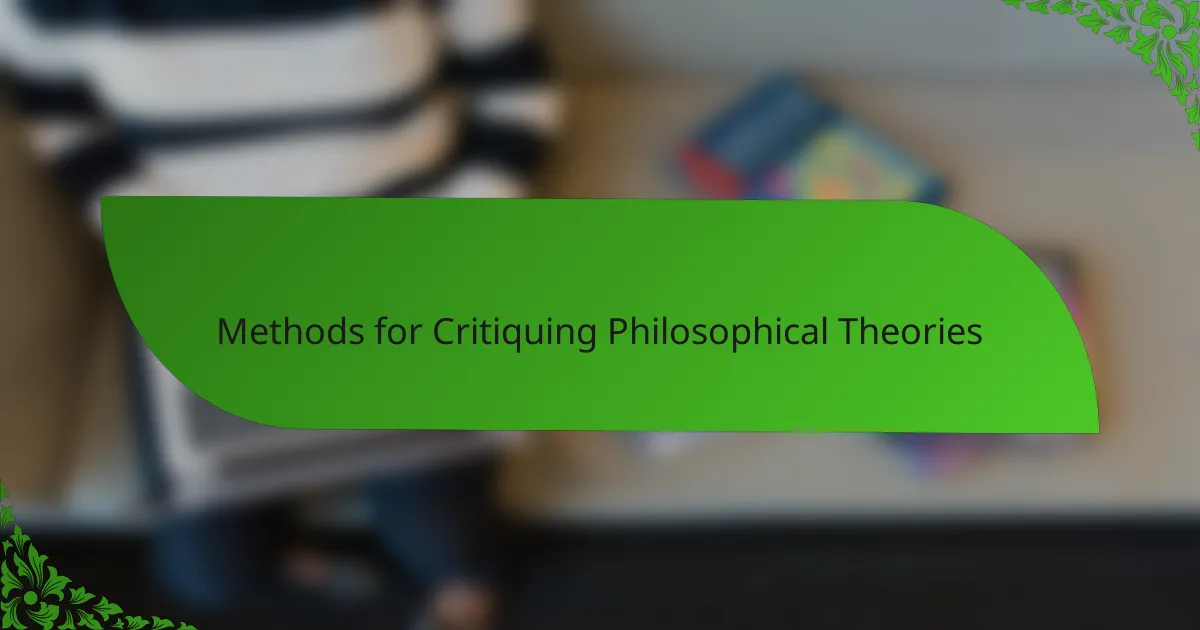
Methods for Critiquing Philosophical Theories
Critiquing philosophical theories often starts with close reading—really diving into the text to understand the argument’s structure and assumptions. I remember feeling puzzled when I first tried this with Mill’s utilitarianism; it forced me to slow down and question every premise rather than just accept the overall message.
Another method I find helpful is testing theories against real-life examples or thought experiments. When I applied this to utilitarianism, I asked myself: does the theory handle moral dilemmas I actually face or hear about? Sometimes, seeing where a theory stumbles in practice reveals more than abstract debate ever could.
Finally, I think it’s crucial to compare the theory with competing ideas. Early in my studies, I would challenge utilitarianism by looking at deontological ethics or virtue ethics, which emphasize different aspects of morality. This contrast helped me spot blind spots in Mill’s approach and better appreciate the strengths and weaknesses of each viewpoint.
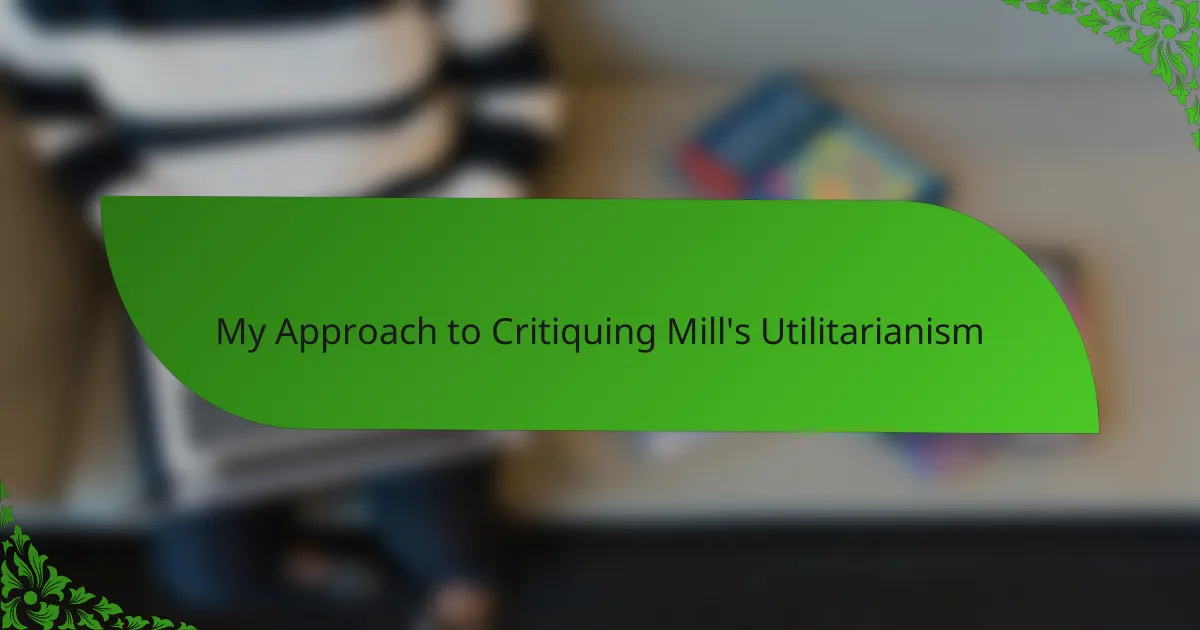
My Approach to Critiquing Mill’s Utilitarianism
When I set out to critique Mill’s utilitarianism, I focused first on unpacking its core assumptions—especially the idea that happiness can be neatly measured and compared. I remember grappling with this because it felt too neat, almost like trying to fit a messy, emotional reality into a dry formula. Can such a powerful ethical theory really capture the fullness of human experience through calculus alone?
I also made it a point to test Mill’s ideas against real, often uncomfortable scenarios from my own life and historical examples. For instance, I asked myself how utilitarianism would handle situations where what’s best for the majority deeply harms a minority. Wrestling with these moral puzzles helped me see where Mill’s framework both shines and falters, making the critique feel urgent and personal rather than just academic.
Lastly, I approached the critique as a dialogue—with Mill, with other philosophers, and with my own doubts. By contrasting utilitarianism with alternative ethical theories I respect, I found myself uncovering hidden assumptions and biases in Mill’s work. This comparative lens turned the critique into an evolving conversation rather than a fixed judgment, which I believe is essential in philosophy.
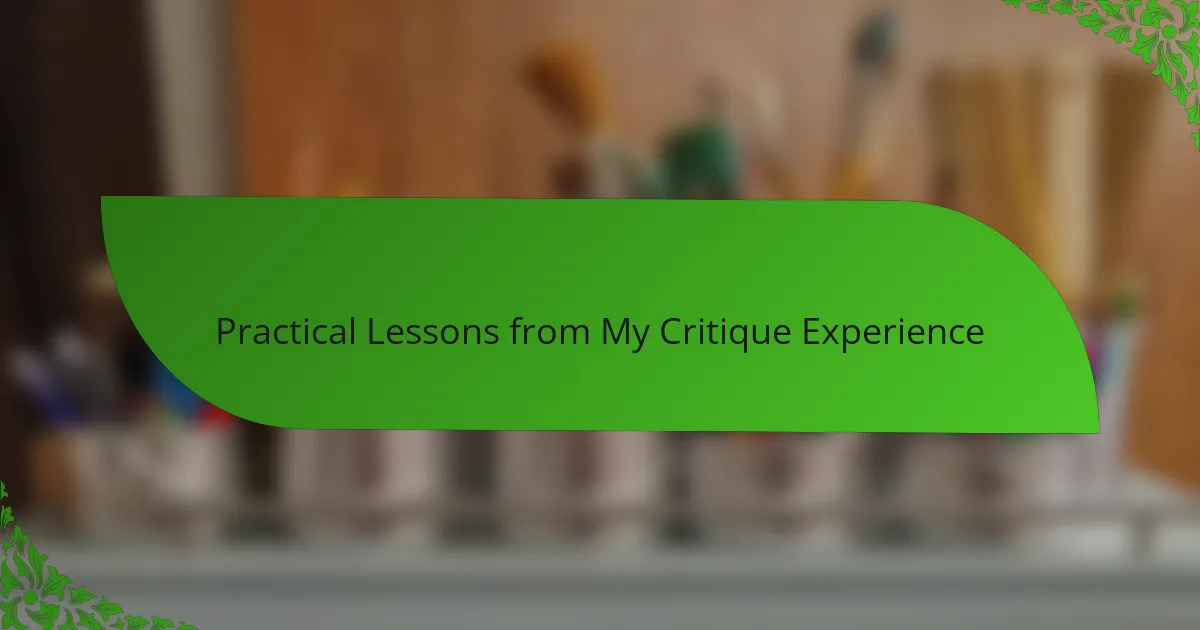
Practical Lessons from My Critique Experience
Looking back on my critique, one practical lesson stands out clearly: the importance of patience. It’s tempting to rush to conclusions, especially with a theory as famous as Mill’s utilitarianism, but taking time to unpack each assumption changed everything. I often caught myself re-reading passages, asking, “Wait, what exactly is Mill saying here?”—and each pause deepened my understanding.
Another insight came from applying the theory to real-life conflicts. I remember feeling a mix of frustration and fascination when I faced situations where maximizing happiness for most meant real suffering for some. It forced me to ask, “Is it enough to focus only on the aggregate good?” Wrestling with this question made the critique not just an intellectual exercise but something fundamentally human.
Finally, I realized critique isn’t about tearing down but about conversation. Challenging Mill’s ideas alongside other moral philosophies taught me to hold space for complexity rather than certainty. It made me appreciate that every ethical framework has blind spots—and that recognizing those gaps is often where the richest learning happens. Have you ever found that questioning a belief led you to surprising growth? For me, that was the heart of this whole experience.
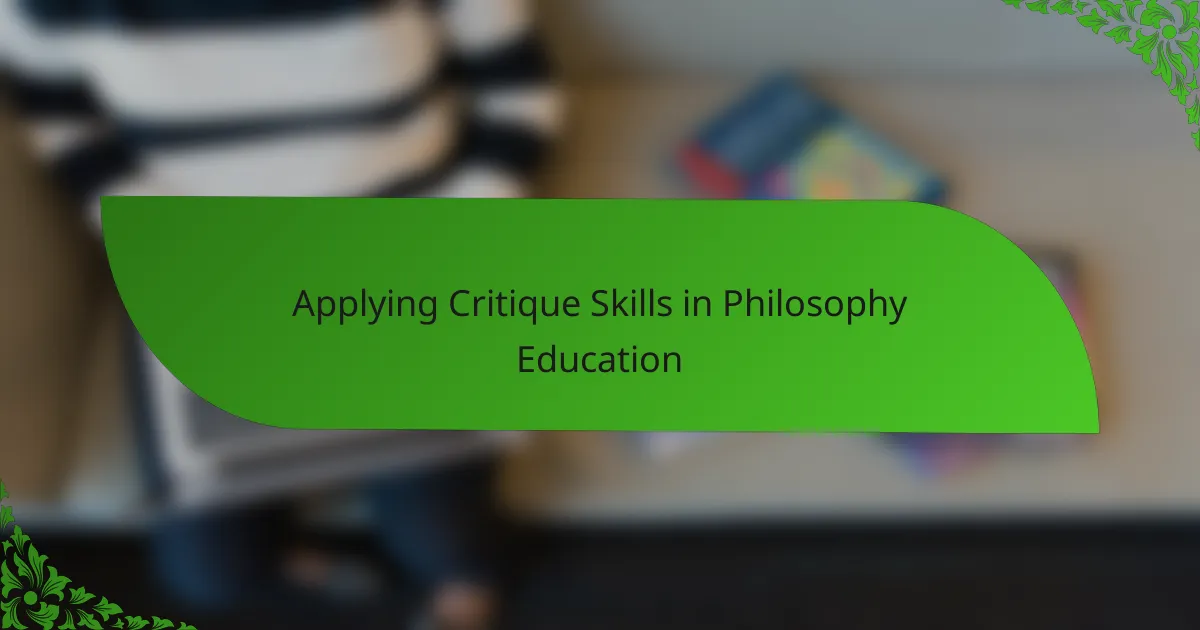
Applying Critique Skills in Philosophy Education
Applying critique skills in philosophy education requires more than just spotting flaws; it demands a willingness to wrestle with ideas deeply and patiently. I’ve found that when I slow down and let myself question even the most respected theories, like Mill’s utilitarianism, the learning becomes more meaningful and less about right or wrong. How often do we give ourselves permission to sit with uncertainty and explore it thoroughly?
Another vital part of applying critique skills is using real-life scenarios to test philosophical claims. When I imagined situations where the “greatest happiness” led to uncomfortable consequences, it sparked honest reflection on the limits of abstract principles. Isn’t philosophy at its best when it connects with the messiness of everyday life?
Finally, I think engaging critique as an ongoing conversation has been crucial in my education. Rather than declaring a theory finished or flawed, I treat it as part of a larger dialogue that includes my own doubts and alternative perspectives. This approach transforms critique from confrontation into collaboration, making philosophy feel dynamic and alive. Have you noticed how questions open doors rather than close them?